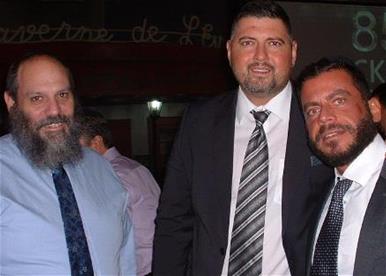MOIRA SCHNEIDER
A great read
As guest speaker at the annual Aish Hatorah gala dinner held at the Greenside Hall last week, Szegedi related how he, a 20-year-old university student in 2003, had co-founded the far-right, anti-Semitic, Jobbik Party; by 2012 it had grown to be the second largest in Hungary. It was at this time that a political opponent claimed to have proof that Szegedi was in fact Jewish.
“To clarify the rumour, I sat down with my maternal grandmother to ascertain whether this was true,” he recalled. “My grandmother (an Auschwitz survivor) admitted she was once Jewish, but she had closed that chapter after the Shoah and was not Jewish anymore.
“She said my maternal grandfather was also Jewish and had worked in a forced labour camp during the Second World War.”

RIGHT: Csanád Szegedi, co-founder of the far-right, anti-Semitic Jobbik Party in Hungary, who was guest speaker at the Aish Hatorah gala dinner. He is flanked by Yaakov Storger (left) and Szegedi’s colleague and translator, Jonathan Megyer PIC: MOIRA SCHNEIDER
The discovery caused personal turmoil, jarring with the internalised image he had of the Jewish people.
“I cannot be Jewish,” he said he thought to himself. “I don’t have a big enough nose, a hunchback and two bags of money under my arms!”
His attempt to meet with a local rabbi was met with disbelief. “He thought I was joking, that it was candid camera,” Szegedi recalls.
“I thought he was going to throw me out. Much worse – he told me I should sit down and learn!”
With his wife, Szegedi was invited to synagogue. Such was the tension there that the rabbi had to call a meeting, where Szegedi faced some aggressive questioning from the community.
“Despite all this, I thought I have no other way to choose but to walk the Jewish way.” He was “pushed” into becoming kosher and observant, including not driving on the Sabbath.
During his interrogation by the community, an old man had asked him when he was going to be circumcised, something he refers to as “not my favourite part of Judaism”. A year later, after the procedure “which I never thought I’d undergo”, Szegedi received his first “aliyah” on Yom Kippur.
“It was the first time I had the opportunity to be called by my Jewish name,” he recalls with pride. “The old man came up to me and said: ‘I pardon you now.’”
Amidst much emotional upheaval, the main issue engaging his mind was how to make up for “all the bad deeds” in his previous life. The Av Beth Din in Budapest suggested he go around to schools, college campuses and universities explaining the dangers of anti-Semitism, as well as address Jewish communities, which has kept him “extremely busy” for the past 18 months.
“What makes someone anti-Semitic?” he ponders. “I had never met a Jewish person in my life. I come from a poor family. Anti-Semitism cannot be rational – it stems from frustration and depression. I did not meet the kind of monsters portrayed in anti-Semitic circles,” he says of his integration into the Jewish community.
“The only thing to do to fight it is to do more to be Jewish, be proud and definitely do not hide it,” he concludes.
“Thank you, my South African family, for welcoming me.”